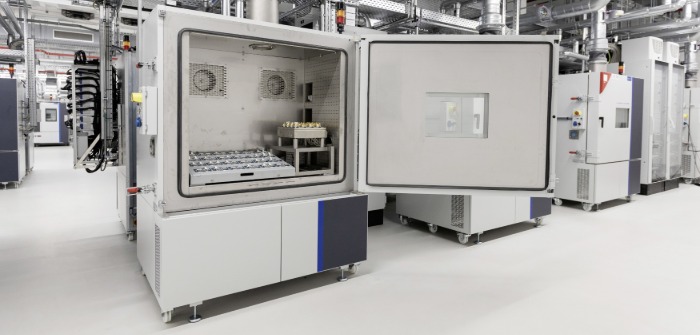A laboratory for battery cell research and development has been opened by Volkswagen in Salzgitter, Germany. The site will be used to further expand battery technology expertise as the OEM moves toward the production of its own battery cells, with Volkswagen unified cells expected to start rolling off the gigafactory production line in Salzgitter in 2025.
The German vehicle manufacturer is to invest around €70m (US82.8m) in the modern facility that houses four laboratories and will eventually have 250 employees conducting research into cell development and analytics.
“Volkswagen’s Salzgitter site demonstrates how the transformation of the German automotive industry from conventional drive systems to e-mobility can succeed,” commented Thomas Schmall, group board member for technology, Volkswagen, and chairman of the board of management, Volkswagen Group Components. “We are attracting cutting-edge researchers and, as a pioneer in the industry, create the jobs of tomorrow.”
By 2030, the Volkswagen Group, along with its partners, is planning to operate six factories to produce battery cells in Europe, with the aim of reaching a production capacity of 240GWh. Cells with an annual capacity of 40GWh will be produced at the Salzgitter site, and the OEM predicts that the unified cell will reduce battery costs by up to half.
“With the opening of the laboratories, we have reached the next strategic milestone. Now we are pushing ahead with preparations for our own cell production with all our strength,” added Schmall.
The 2,500m2 laboratories will enable Volkswagen to carry out cell testing programs with up to 200 different analytical methods and the development of new formulations.
The Salzgitter facility features a scanning electron microscope for detecting lithium, one of only a few in the world, and a highly automated test field that can test cells for performance and signs of aging during rapid charging and discharging. This test includes certain cells that can be charged from 5% to 80% within 12 minutes.
At the site, the laboratories have been split into four main areas consisting of a cell development lab, an analytics lab, the environmental and safety lab, and an electrical test field laboratory.
The cell development lab conducts evaluations on new materials and accesses their suitability. Chemical formulations, electrode materials and other processes are further developed here also. In the analytics lab, the raw materials of the cells and the components are disassembled so that analysis can take place. Cells are subjected to a range of endurance tests in six chambers in the environmental and safety lab, while in the electrical test field laboratory, a wide range of cells are tested for performance and measured electrically to access aging phenomena, and long-term durability.
Around 160 out of 500 employees at the Center of Excellence (CoE) Battery Cell in Salzgitter are currently involved in cell development, and the OEM estimates that by the end of next year, the CoE will employ more than 1,000 people.
“One of the most important future technologies for the Volkswagen Group is being driven forward here. Everything that is done at the Center of Excellence Battery Cell serves to provide customers of all Group brands with e-vehicles with the greatest possible range, charging performance, sustainability and safety,” said Frank Blome, head of the battery cell and battery system business unit.


